Article 91: John Broadus Watson and the “coffee break” culture that celebrates a creative lifestyle
The “coffee break” culture plays an important role in the economic development and creative lifestyle of American society and the world.
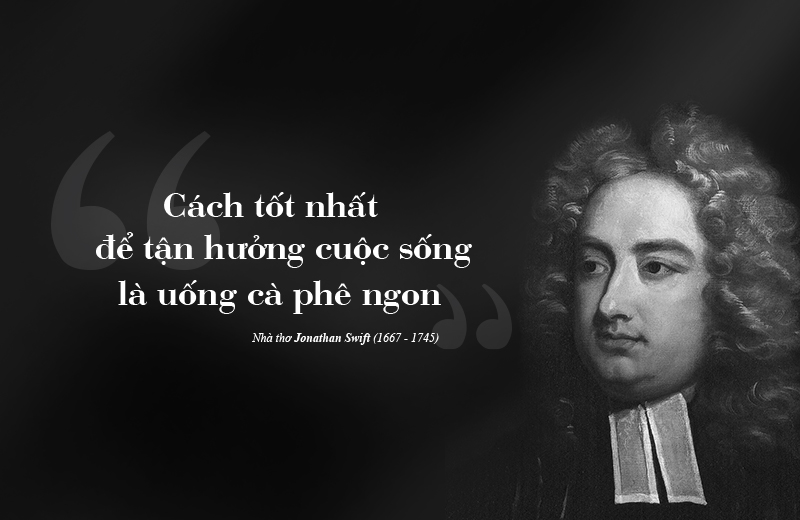
“The best way to enjoy life is to drink good coffee” – Poet Jonathan Swift (1667 – 1745
Psychology – From theory to shaping culture and lifestyle
After Wilhelm Wundt established the first Psychology laboratory in Leipzig, Germany, and separated Psychology as an independent science in 1879, psychology quickly spread throughout Europe and North America. At American colleges and universities in the early 1800s, psychological principles were taught in courses in moral and spiritual philosophy. In 1892, the American Psychological Association (APA) was born, shaping the development of psychology in this country.
From about 1920 to the mid-1950s, Behavioral Psychology, a new theory established in 1913 by psychologist John Broadus Watson (1878-1958), began to become the dominant school of thought in American psychology. Behavioral psychology has fundamentally changed the conceptual system and overcome the subjectivity in contemporary psychology research. Accordingly, the object of Psychology is behavior, not consciousness like previous psychological theories. The method of psychological research is to objectively experiment through observable actions, not thoughts and feelings. Watson believes that genetics is not the sole determinant of human development and learning, but also depends on conditioned reflexes and the environment.
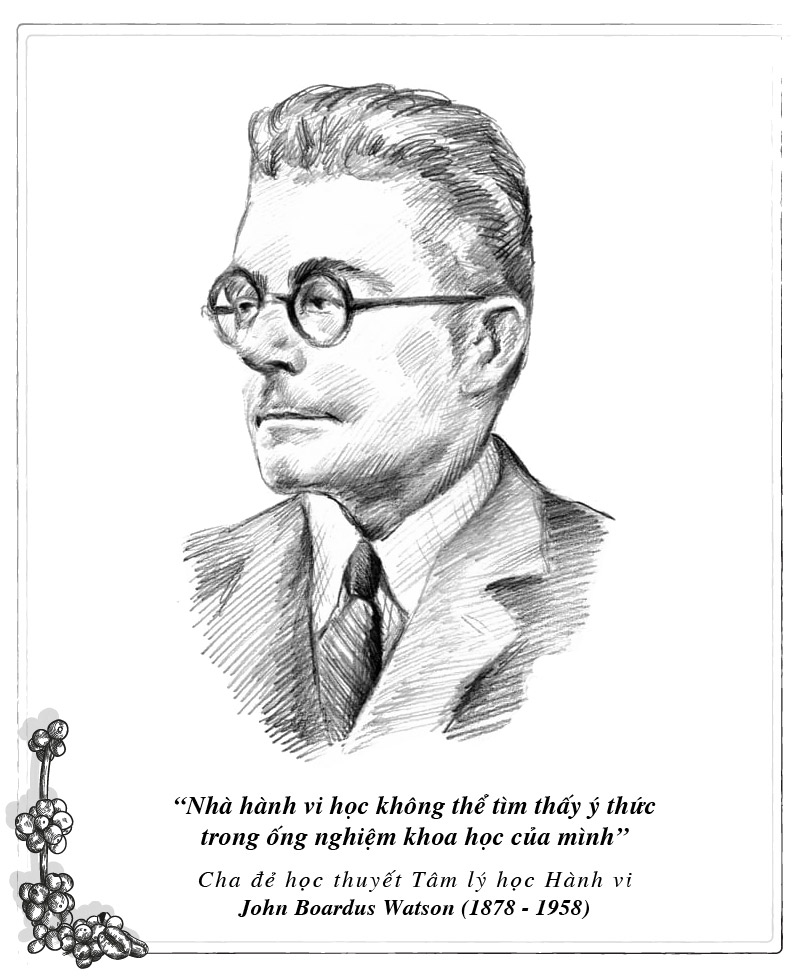
“The behaviorist cannot find consciousness in the test-tube of his science.” – Founder of Behavioral Psychology Theory John Broadus Watson (1878-1958)
With the nature of studying human emotional states and behaviors, for more than a century, psychologists have applied scientific theories to real life. Accordingly, Watson’s Behaviorism and approach to psychology paved the way for many psychologists to research and lay the groundwork for the fields of therapy, education, and parenting. As for Watson, after finishing his academic career and switching to advertising, he successfully applied his theory to work, contributing to the explosion of the communication and marketing industry at that time.
By applying behavioral theory techniques, especially the three-stimulus formula: fear, anger, and love to promote consumer behavior, Watson has initiated many successful advertising campaigns. In the advertising campaigns for coffee in 1921 and 1952, using classic conditioning techniques combined with the idea of coffee breaks, Watson gave birth to the term “coffee-break” and shaped it as a cultural feature and lifestyle of Americans at that time. Through advertising campaigns conducted by John Broadus Watson, “coffee-break” quickly became popular, becoming a national issue and one of the important foundations in the lives of American workers in the 20th century.
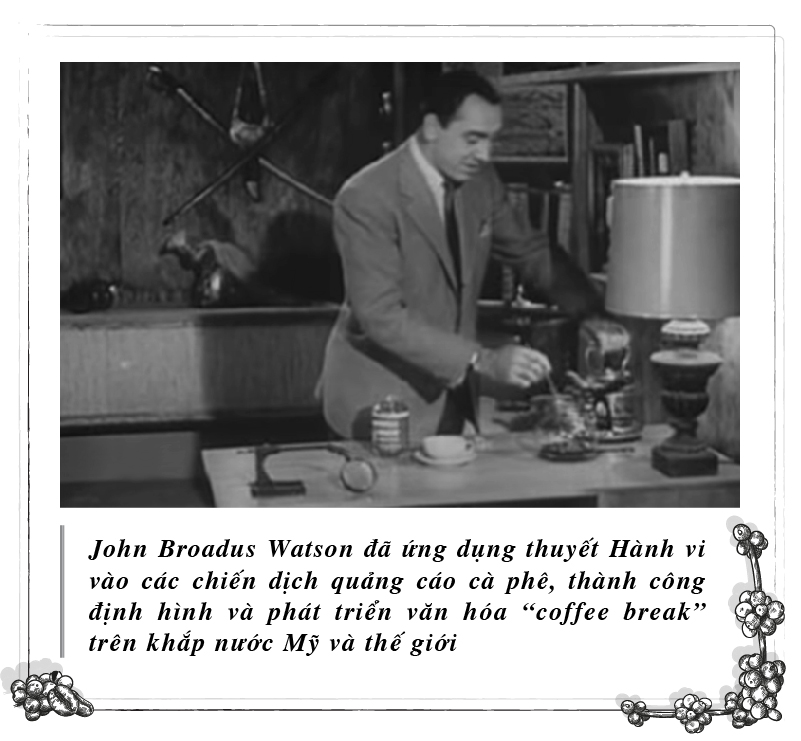
John Broadus Watson successfully applied Behaviorism to coffee advertising campaigns, shaping and developing a “coffee break” culture across the United States.
The “coffee break” culture celebrates a creative lifestyle
After the Boston Tea Party (1773), coffee was considered “King of the American table”. The influence of coffee and coffee shops has transcended beyond a form of drink and conversational space. Coffee shops have become spaces for business transactions, political conferences, theatres, exhibitions and other social and cultural activities of the American society. Especially, in the 19th century, with the energy to promote concentration, increase work efficiency and human creativity, coffee became an “exemplary” drink in the American society. Average coffee consumption increased from 3 pounds per year to 5.5 pounds in 1850 and 8 pounds in 1859. In 1876, coffee imports to the United States accounted for about a third of the world’s coffee.
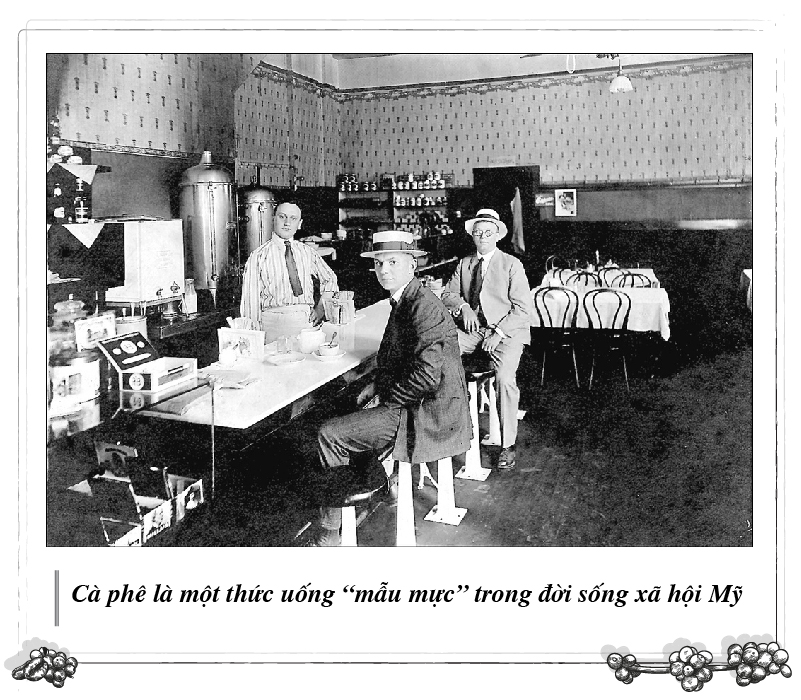
Coffee became an “exemplary” drink in the American society
The popularity of coffee and the growth of advertising media in the US at that time promoted the popular coffee culture in this country. Coffee was present all over the street, in offices, factories, kitchens of households, and was drunk in various forms of black or mixed with other ingredients such as sugar, milk, cream… Especially, drinking coffee was a permitted and encouraged activity during the morning and afternoon breaks of factory workers since the late 19th century to improve work performance. At the beginning of the 20th century, the concept of “coffee-break” was first incorporated in the advertising campaign of the Maxwell House coffee company conducted by behavioral psychologist John Broadus Watson. However, it was not until the 1950s that the term “coffee-break” was popularized through the Pan American Coffee Bureau’s “Give yourself a coffee-break” advertising campaign, also in charge by John Broadus Watson.
Along with the message “Give yourself a coffee-break… and get what coffee gives to you”, the values of coffee bring to people like “Work better”, “Feel Better”, “Think Better” were strongly confirmed through advertisements. With specific stories and images of happy people, in all fields from workers, fishermen, office workers, engineers, experts, artists… sitting around a cup of coffee to rest, recharge, regain alertness, focus on work; or chat, share, look for ideas… at work, in the office, in the kitchen, in restaurants… at any time of the day, has inspired and motivated the community to make “coffee-break”. Immediately after this campaign, with the promotion of coffee consumption in the United States, “coffee-break” entered the international lexicon, and by 1957 had become the negotiating point for workers’ welfare policy in the American industry.
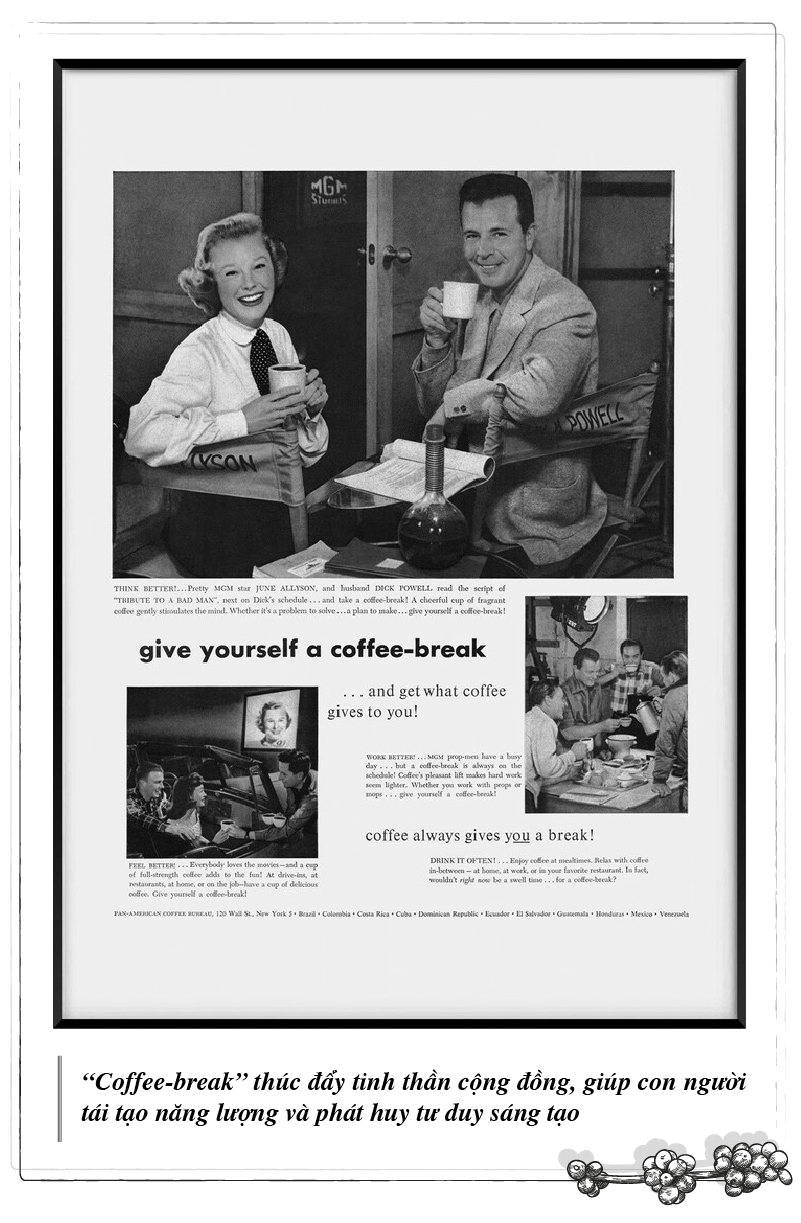
“Coffee-break” promotes community spirit, helps people regenerate energy and promote creative thinking
With mass media activity, praising an active, richer and happier lifestyle, the “coffee-break” culture spread throughout the United States in the second half of the 20th century, being adopted as an American business culture. Here, “coffee-break” has created conditions for everyone to have the opportunity to exchange on many different topics, share experiences, thereby reducing stress, promoting community spirit, helping people renew energy, increase productivity and promote creative thinking. The values of “coffee-break” were quickly recognized and applied worldwide.
In Sweden, with a consumption of 7.32kg of coffee/person/year (According to the International Coffee Organization), this country attaches great importance to drinking coffee and Fika – another way of calling “coffee-break” in the culture here. In businesses, Fika can take place at any time and many times a day, to improve team spirit, socialize, reduce stress and seek support and advice from colleagues. Meanwhile in the UK, “Elevenses” is a term for a break for tea or coffee that traditionally takes place around 11am and is considered an integral part of the workday. Businesses in the UK also create central areas to conduct Elevenses and facilitate employees from different departments to exchange work face-to-face instead of via email. For Japan, “coffee-break” includes both coffee and green tea. The “coffee-break” time at Japanese businesses is a time for employees to update issues and show themselves as active participants in the working group.
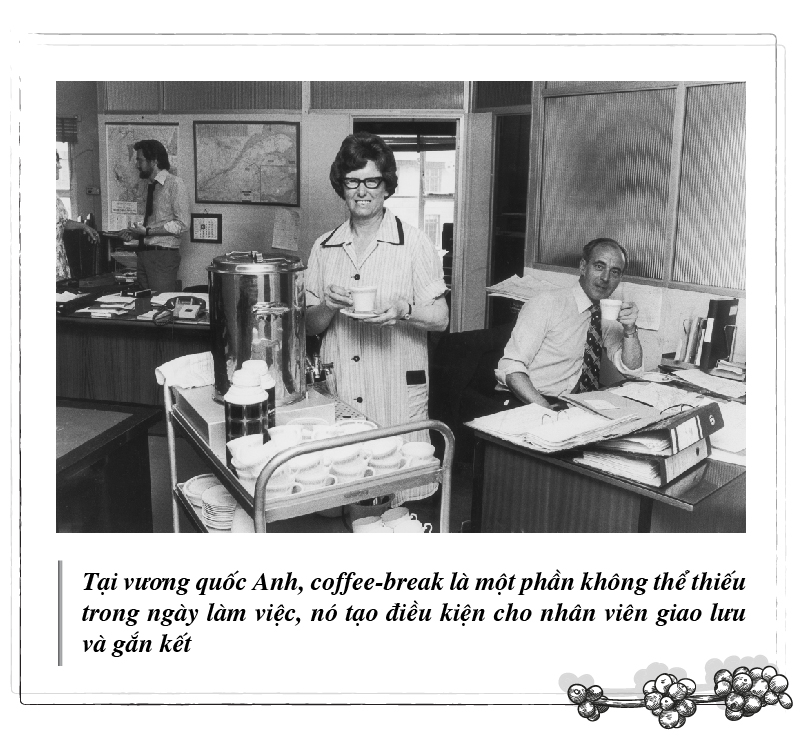
In the UK, coffee-break is an indispensable part of the working day, it facilitates employees to socialize and engage.
Today, the world economy is gradually shifting to the form of a green economy, a creative economy with the core of which being the creative and innovative capacity of everyone, organization, and nation… The “coffee-break” cultural value facilitates free social communication, intellectual exchange, and promotion of the spirit of creativity, is becoming popular, appearing in most conferences and seminars of all fields: meetings, gatherings of each business, as well as during rest time at factories or for individuals.Carrying a source of awakening energy, coffee is increasingly taking a special position in the process of promoting creative culture of individuals, organizations and nations. At the same time, coffee plays the role of the main energy contributing to shaping the lifestyle, creating soft power for nations in the era of green economy and creative economy.
Readers are cordially invited to watch the series of Coffee Tao videos posted on https://bit.ly/caphetrietdao
THE REAL COFFEE
ROASTED ONLY FOR PEOPLE OF WISDOM!
Source: “The Philosophical Way of Coffee” – copyright by Trung Nguyen Legend
Coming up: Coffee shops and the formation of social institutions


